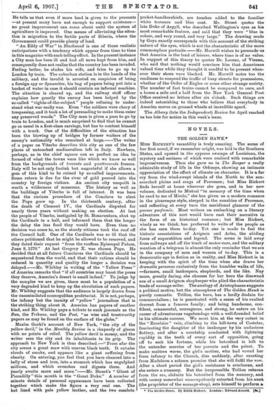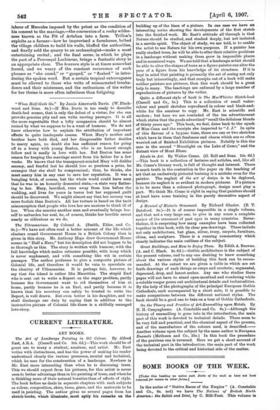NOVELS.
THE GOLDEN HAWK.*
MISS RICKERT'S versatility is truly amazing. The scene of her first novel, if we remember aright, was laid in the Southern States, and opened in the cypress swamps of Louisiana, the mystery and eeriness of which were realised with remarkable impressiveness. Then she gave us in The Reaper a really admirable study of life in the Orkneys, showing an intimate appreciation of the effect of climate on character. It is a far cry from the wind-swept islands of the North to the sun- scorched plains and crags of Provence; but Miss Rickert finds herself at home wherever she goes, and in her new volume, dedicated to Mistral "in memory of the time when he read to me of Mirelo," she has given us a modern romance in the picaresque style, steeped in the sunshine of Provence, and reflecting at every turn the meridional glamour of the queues parfumee. Most writers on embarking on a literary adventure of this sort would have cast their narrative in the form of an historical romance ; but Miss Rickert, wisely as we think, has 'preferred to write of the people as she has seen them to-day. Yet one is made to feel the historic associations of Avignon and Arles, the abiding force of superstition and legend. The scene is laid away from railways and off the track of motor-cars, and the solitary mention of a telegram is almost the only reminder that we are in the company of men and women of to-day. This is a democratic age in fiction as in reality, and Miss Rickert is in keeping with the spirit of the time when she draws her dramatis personae exclusively from the humbler walks of life, —farmers, small innkeepers, shepherds, and the like. Nay more, greatly daring, she chooses for her hero the disowned son of a small Avignon shopkeeper who plied the characteristic trade of sausage-seller. The analogy of Aristophanes suggests a political motive, but the atmosphere of The Golden Hawk is purely romantic. Trillon, the hero, has a lordly disdain for commercialism ; be is penetrated with a sense of his exalted descent from a famous family; and being handsome, con- fident, ornamental, courageous, and strong, be enters on his career of adventurous vagabondage with a well-founded belief in his ultimate success. We meet him at the very outset in the " Excelsior " vein, climbing to the bill-town of Castelar, fascinating the daughter of the innkeeper by his audacious flattery, and after a courtship conducted with lightning rapidity in the teeth of every sort of opposition, going off to seek his fortune, while his betrothed is left to the untender mercies of her parents and the priest. To make matters worse, the girl's mother, who had vowed her from infancy to the Church, dies suddenly, after exacting from Madeloun a solemn promise that she will fulfil the vow. After a short period the girl's resistance is overborne, and she enters a nunnery. But the irrepressible Trillon returns from the sea, abducts his betrothed from the nunnery, and with money somewhat unscrupulously extorted from his aunt (the proprietor of the sausage-shop), sets himself to perform a
• The Golden Baia. By Edith Rickert. London Edward Arnold.
labour of Hercules imposed by the priest as the condition of his consent to the marriage, the conversion of a rocky wilder- ness known as the Pit of Artaban into a farm. Pillion's exploits as a fanner—how he improvised a farmhouse, bribed the village children to build his walls, bluffed the authorities, and finally sold the quarry to an archaeologist—make a most entertaining recital ; and the final scene, in which be plays the part of a Provençal Lochinvar, brings a fantastic story to an appropriate close. The bravura style is at times somewhat forced, and we weary of the constant recurrence of Buell phrases as " she cooed," or " gasped," or " flashed " in intro- ducing the spoken word. But a certain tropical extravagance must be allowed to those who write of reincarnated trouba- dours and their mistresses, and the enthusiasm of the writer for her theme is more often infections than fatiguing.











































 Previous page
Previous page